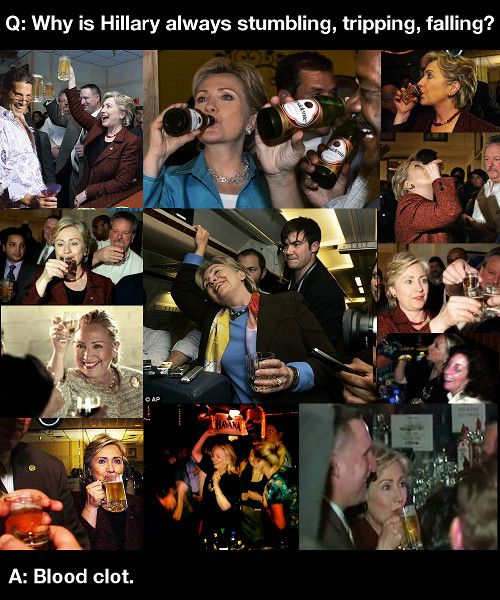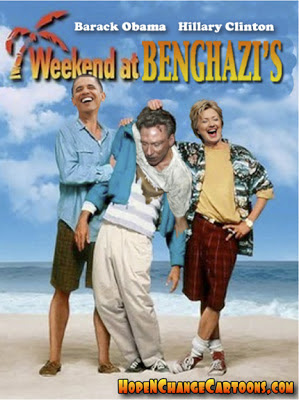Skip to comments.
Hillary Clinton was loyal soldier but no great shakes at policy
Philadelphia Inquirer ^
| February 3, 2013
| Trudy Rubin
Posted on 02/03/2013 12:50:57 PM PST by neverdem
When Hillary Clinton took office, much of the world had been alienated from the United States by the policies of the Bush administration. Expectations were high that President Obama's team would change the tone, and Clinton delivered. She put a glamorous, smart, politically astute face on American policy.
Yet Clinton produced no diplomatic breakthroughs nor any new strategic doctrine. And when it comes to issues of war and peace - in the Mideast, South Asia, and North Asia - she leaves a minimal legacy.
In large part, that's because policy-making was tightly controlled by the White House. It's hard to know whether Clinton would have acted differently if President Obama had, in the manner of Richard M. Nixon, anointed her as his Henry Kissinger. But that was never in the cards.
Instead, Clinton appeared to endorse Obama's view of America's more limited role in an age of austerity, defined by other rising global powers. As a loyal soldier, she used her stellar political skills to strengthen old alliances in Europe and promote new ones in Asia as part of a "pivot" in that direction. She mended diplomatic fences and conducted negotiations, notably on Iran sanctions.
But she has no major foreign policy success she can call her own.
Initially, Clinton did try to carve out a greater role by appointing three "special envoys," loyal to her, as policy overlords on key issues. Richard Holbrooke got the AfPak brief, George Mitchell the Arab-Palestinian issue, and Dennis Ross, Iran. But Holbrooke's mercurial personality so alienated Afghan and Pakistani leaders that the White House finally cut him out of the process, while Mitchell failed to make any headway and resigned. Ross, sensing where power lay, left the State Department and moved to the White House.
Meantime, the Mideast peace process died, the Syrian civil war dragged on, Iran's nuclear program continued, and the dangerous AfPak mess remained unresolved (except for Obama's pledge to withdraw U.S. troops).
Clinton turned her prodigious energy to soft-power issues. She chose as her head of policy planning Anne-Marie Slaughter, who argued that U.S. power in the future would be based on our supreme talent for networking - creating linkages of government and private organizations to deal with issues that cross conventional boundaries, such as Internet security or climate change.
The secretary threw herself into public diplomacy, famously visiting 112 countries - and conducting town hall meetings with students, journalists, and civil society activists as far afield as Moscow, Manila, and Phnom Penh. When I visited Islamabad in 2009, I heard Pakistanis rave about how she had won over skeptical students in Lahore with her tough, honest responses.
Yet her magnetic personal qualities, while winning her accolades, didn't guarantee successful policy-making. Her several visits to Islamabad did not persuade Pakistani politicians and generals to stop providing safe havens to the Taliban. Nor did they necessarily change America's image abroad; Polls still show that America is less popular in Pakistan than its own archenemy, India, and its reputation is still sinking in the Middle East.
The secretary also carved out signature areas of special interest. One was development aid, where Clinton tried to revamp our troubled policies, especially in conflict areas - arguing that diplomats and civilian-aid officials should control aid delivery rather than leaving it to the military.
Sadly, the dangers in conflict zones mostly kept aid officials from leaving their bases, and the use of civilian contractors still leads too often to rank corruption. These problems, which originated in the Bush administration, still remain unresolved.
Then there is Clinton's most passionate commitment - to the promotion of women's issues, which she inserted into every sphere of policy. She appointed a special emissary for women's affairs, Ambassador Melanne Verveer, who traveled the globe seeking to determine where U.S. policy could improve women's status and boost economic development.
This emphasis is important and should be continued. Yet I can't help wondering about its lasting impact. The signature country where the United States has promoted the advancement of women is Afghanistan. U.S. officials, Clinton included, have pledged not to abandon Afghan women.
There is a disconnect here. If Obama withdraws nearly all or all U.S. troops, and limits the U.S. role there to special forces and drones, all the gains women and girls have made in the last decade will be rolled back. In this case, as in so many, soft power can only have an impact if it is backed up by hard power - meaning concrete evidence of continued U.S. support.
Here is where Clinton's legacy may prove most ephemeral. She has promoted soft power, and showed she can represent American splendidly abroad, but - unless she becomes president - we won't know how she would exercise hard power.
TOPICS: Editorial; Foreign Affairs; Politics/Elections; US: New York
KEYWORDS: abedin; bhoforeignpolicy; hillaryclinton; nwo; sharia; softpower; soshillary; unagenda
Navigation: use the links below to view more comments.
first previous 1-20, 21-32 last
To: neverdem
Hillary Clinton was loyal soldier but no great shakes at policy No historian will ever confuse her, as Secretary of State, with Thomas Jefferson, George Marshall, Henry Kissinger or George Shultz.
Eventually, they will surely put her in the Madeleine Halfbright league.
21
posted on
02/03/2013 1:47:48 PM PST
by
stevem
To: neverdem
My only comment is:
No one should use the word “shakes” in the same sentence as “Hillary”
22
posted on
02/03/2013 1:49:40 PM PST
by
stanne
To: neverdem
Hillary is loyal to get the White House. She drinks because in her heart she is not sure they will ever give it to her. Hillary’s soul is owned by her masters.
23
posted on
02/03/2013 1:53:00 PM PST
by
bmwcyle
(People who do not study history are destine to believe really ignorant statements.)
To: neverdem
She is a boob and rides on the coattails of every man she has come in contact with while pretending to be the greatest woman on earth which, of course, is a crock.
24
posted on
02/03/2013 1:55:39 PM PST
by
freekitty
(Give me back my conservative vote; then find me a real conservative to vote for)
To: MestaMachine
Allow me to be the first to say BULL SH!T!!!
I second that, fear is a form of respect and no one respects Obama.
25
posted on
02/03/2013 1:59:52 PM PST
by
Big Horn
(Rebuild the GOP to a conservative party)
To: stevem
No historian will ever confuse her, as Secretary of State, with Thomas Jefferson, George Marshall, Henry Kissinger or George Shultz.
Since most historians are liberal, I expect Ms. Clinton to eventually be elevated above all those misogynist white men.

26
posted on
02/03/2013 2:01:09 PM PST
by
Bratch
To: neverdem
“Great shakes?” We don’t call Hillary The Hildebeast for nothing!
With that thought, I think I’ll order a Bob’s Big Boy banana milk shake served with whipped topping and a maraschino cherry. Mmmmmmm! Just right for Superbowl Sunday!
27
posted on
02/03/2013 2:22:03 PM PST
by
jonrick46
(The opium of Communists: other people's money.)
To: AdmSmith; AnonymousConservative; Berosus; bigheadfred; Bockscar; ColdOne; Convert from ECUSA; ...
Thanks neverdem.
It's hard to know whether Clinton would have acted differently if President Obama had, in the manner of Richard M. Nixon, anointed her as his Henry Kissinger. But that was never in the cards. Instead, Clinton appeared to endorse Obama's view of America's more limited role in an age of austerity, defined by other rising global powers. As a loyal soldier, she used her stellar political skills to strengthen old alliances in Europe and promote new ones in Asia as part of a "pivot" in that direction. She mended diplomatic fences and conducted negotiations, notably on Iran sanctions. But she has no major foreign policy success she can call her own. Initially, Clinton did try to carve out a greater role by appointing three "special envoys," loyal to her, as policy overlords on key issues. Richard Holbrooke got the AfPak brief, George Mitchell the Arab-Palestinian issue, and Dennis Ross, Iran. But Holbrooke's mercurial personality so alienated Afghan and Pakistani leaders that the White House finally cut him out of the process, while Mitchell failed to make any headway and resigned. Ross, sensing where power lay, left the State Department and moved to the White House.
IOW, her three key people either bailed, or sucked, or both, and she had no successes at all, because Zero's only ongoing work that makes any sense is the all-talk hands-off approach to the mess in Syria, and we haven't seen the denouement of that one.
28
posted on
02/03/2013 2:39:30 PM PST
by
SunkenCiv
(Romney would have been worse, if you're a dumb ass.)
To: Diana in Wisconsin
Amazing isn’t it that in a little more than 5 years the US has gone from “projecting overwhelming force anywhere in the world” to hiding behind “smart power”.
29
posted on
02/03/2013 3:31:45 PM PST
by
gov_bean_ counter
(Hope and Change has become Attack and Obfuscate.)
To: neverdem
Hillary Clinton was loyal soldier but no great shakes at policy Pretty much sums up her legal/public life since the Watergate hearings.
30
posted on
02/03/2013 3:52:33 PM PST
by
hattend
(Firearms and ammunition...the only growing industries under the Obama regime.)
To: All
31
posted on
02/03/2013 3:54:50 PM PST
by
musicman
(Until I see the REAL Long Form Vault BC, he's just "PRES__ENT" Obama = Without "ID")
To: neverdem
Navigation: use the links below to view more comments.
first previous 1-20, 21-32 last
Disclaimer:
Opinions posted on Free Republic are those of the individual
posters and do not necessarily represent the opinion of Free Republic or its
management. All materials posted herein are protected by copyright law and the
exemption for fair use of copyrighted works.
FreeRepublic.com is powered by software copyright 2000-2008 John Robinson



